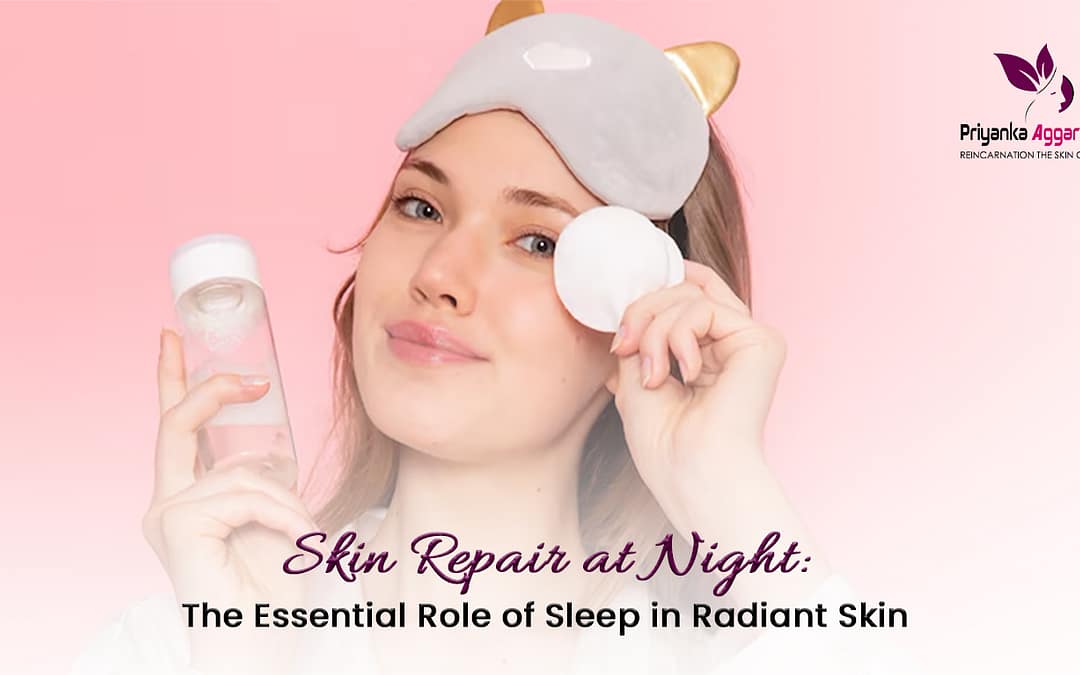Growing up, the one thing that we were always advised was not to compromise on sleep for our skin, but did we ever wonder how sleep was connected to our skin? The role of sleep isn’t limited to just your brain function, but also is the only time when your skin gets to heal and repair naturally without any obstruction. Next time you think of pushing yourself to watch that last episode at 4 am, just remember that you’re not doing good to your skin!
Table of Contents
How Sleep Affects Your Skin:
Once we sleep, the body enters a restorative state, during which it begins repairing tissues.
- Increased Blood Flow: Once we sleep, our body calms down, which in turn increases the blood flow throughout the body. This leads to proper delivery of nutrients throughout the body, which is important for skin repair.
- Cell Regeneration: The cell division speed is considered to be at its peak during 11 pm at night, which means our cells regenerate faster during the night when compared to the daytime.
- Collagen Production: Collagen isn’t just a new fad. Collagen is a protein that decreases in your body as you age, and hence, people prefer taking supplements as they help in skin repair and healing.
- Growth Hormone Release: Once we sleep, our body releases certain growth hormones that play a vital role in sleep-related skin repair by accelerating cell and tissue regeneration processes in your body.

Always remember that clear skin is not just limited to using expensive skincare and following a strict diet (once or twice a month- let’s be honest), but following a proper sleep schedule is extremely crucial, along with a proper diet.
What Happens to Your Skin When You Don’t Sleep Well?
There have been times when we’ve woken up after sleeping for 4-5 hours, which actually reflects on your skin. It is not wrong to say that your skin is a mirror of whatever is happening inside, as well as a result of external factors which might not be in our control.
Once you disrupt your sleep cycle, you might observe certain skin issues, which are mentioned below:
- Dark Circles and Puffiness: Sleep deprivation causes the blood vessels beneath the thin skin around your eyes to dilate, forming those unwanted dark circles. Fluid also builds up, resulting in puffiness and making you feel tired throughout the day.
- Accelerated Ageing: Long-term sleep loss disrupts the nighttime repair processes that keep skin strong, resulting in early fine lines and wrinkles. A study revealed that poor sleepers had more evidence of skin ageing and a slower response to other environmental factors.
- Inflammation: Lack of sleep initiates inflammatory reactions around the body, including on your skin. This may result in skin conditions such as acne, eczema, and psoriasis worsening by interfering with the skin healing processes that depend on sleep.
- Dullness and Dehydration: Your skin becomes deprived of water when you lack sleep, leaving your skin looking dull. The function of sleep in skin repair also involves proper levels of hydration.
- Slower Healing: Cuts, spots, and other skin issues heal more slowly if you do not have sufficient rest because skin healing while sleeping is hindered.
How Much Sleep Do You Need?
The role of sleep is extremely essential for the repair and regeneration of cells and hence shouldn’t be overlooked at any cost. One should note that sleep requirements might vary according to the age of an individual.
- A child might need at least 9-12 hours of sleep daily
- A teenager might need 8-10 hours of sleep daily
- An adult might need just require 7-9 hours of sleep on a regular basis
It’s always said that quantity and quality are equally important. To get the most skin repair out of sleep, give your body a much-needed break.

These are the following steps that you should follow for good skin:
- Having a regular sleep schedule
- Having a dark, cool sleep environment
- Do not use any electronic gadget at least an hour before you sleep
- It is advisable not to drink caffeine and wine as they disrupt your sleep cycle, causing you to stay awake
By valuing these sleep hygiene strategies, you’re essentially enriching your skin’s natural repair systems that work best while you’re sleeping.
When You Need a Doctor’s Suggestion:
All of us know the importance of sleep in our schedule, but still might face certain skin conditions for which it is better to seek expert suggestions rather than try random treatments by yourself!
- You have long-term skin problems even when you’re getting proper sleep and following a good skincare regimen
- You observe sudden and significant changes in your skin’s appearance or feel
- You have chronic sleep problems that are impacting your skin health
- Your skin concerns are bothering you emotionally or impacting your daily routine
In such cases, consulting the best dermatologist is important. Dr. Priyanka Aggarwal, one of the best skin doctors in Kolkata, offers expert diagnosis and personalised treatments tailored to your unique skin concerns. Having worked in the field for 13+ years and boasting a reputation for caring service, she looks not only at external factors, but also at your internal balance to find the root of the problem and restore the natural glow to your skin.
Conclusion:
Now we know that skin and sleep aren’t just an age-old saying. One should never underestimate the power of sleep, as the skin repair that is observed at night can never be achieved at any other time throughout the day. By prioritising quality sleep, you’re essentially giving your skin the optimal conditions it needs for repair and restoration. Keep in mind that good quality sleep is a complement to good skincare.
Even the most costly products cannot replace the remarkable skin repair processes that occur during sleep. So tonight, don’t just think of your beauty sleep as the most critical thing to do for your skincare routine!
Also read: How to Manage Vitiligo: Expert Tips for Skin Care and Confidence
FAQ
How many hours of sleep are needed for healthy skin?
At least 7 hours of sleep is the minimum requirement for each individual, as advised by dermatologists for the repair and rejuvenation of skin cells. Children require more sleep when compared to teenagers, who need a minimum of 7-9 hours of sleep for daily functioning.
Which hormones support skin repair during sleep?
These are some vital hormones that facilitate skin repair when we sleep:
Growth Hormone: Secreted during deep sleep, it hastens cell regeneration and repair of the skin
Melatonin: In addition to controlling sleep, melatonin is an antioxidant that helps heal skin by combating free radical damage
Cortisol: Tends to fall while asleep, enabling inflammatory reactions to decelerate and repair of the skin to occur
These hormones act harmoniously at rest, evincing the importance of sleep in the repair of the skin and the maintenance of skin health.
Does sleeping early improve skin health?
Yes! Synchronising your sleeping schedule with your body’s internal circadian clock maximises the skin repair processes that take place during sleep. The best hours for skin repair are usually between the hours of 10 PM and 2 AM. Within this time, your body produces melatonin and growth hormones most strongly, maximising sleep’s function in skin regeneration and repair.

